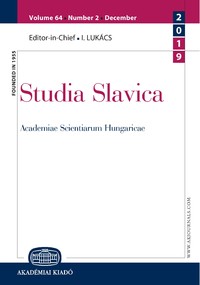Транспозиційні можливості грамеми минулого часу в аспекті вираження оцінних значень: психолінгвістичні особливості
Transpositional Possibilities of the Past Time Grammeme in the Aspect of Estimative Expressions: Psycholinguistic Features
Author(s): Oksana KhalimanSubject(s): Eastern Slavic Languages
Published by: Akadémiai Kiadó
Keywords: Ukrainian language; grammeme; the past time; transposition; secondary function; igreme; estimative expression; psycholinguistics
Summary/Abstract: The present paper analyses the transpositional possibilities of the past time grammeme in the aspect of estimative expressions. The mechanisms of modelling grammatical igreme for the expression of evaluative meanings which are generated on the basis of figurative actualization of the grammatical meaning of the past time and the psycholinguistic features of the figurative use of the past time forms are highlighted. The temporal sign of the form comes into conflict with the temporal sign of the con- text, which provides a metaphor for the grammatical meaning of time, the actualization of the secondary function, obtaining estimative expressions and the expression of a certain pragmatics. It is also important to use a kind of intonation design and inversion word order (in some models) to express irony. The use of time forms both literally and figuratively is based on psychological fea- tures of their perception and associative nuances associated with the specifics of the past, present, and future. In particular, by nominating future events in the form of the past tense, the person puts a hypothetical, upcoming event as a precedent in line with other events of his experience, thereby finds grounds to evaluate it by making appropriate comparisons. The first model (Боявся я її / Так я їй і сказав): an ironic statement of action means that, in fact, according to the speaker, it will never happen, or it is unacceptable, thus it is accompanied by a negative evaluation. The second model (Ну, приїхала я туди, а потім що?): in answers, comments on a call to action the speaker, predicting his, in his own opinion, inappropriate behaviour, uses the past tense for its negative evaluation, also using specific intonation for expressing irony. The third model (А потім йому швидко кубики почепили…): the use of the past per- fect tense form to indicate future facts often creates a negative connotation that expresses an appropriate attitude to the unnaturally rapid development of events and implies poor performance, inappropriateness of actions, mismatch to certain individuals. In contrast to the previous model, there is no meaning of condition in this one since the speaker considers the future action as having already taken place and thus evaluates it. The statement is char- acterized by a specific intonation, which expresses claims for the action, dissatisfaction with the possible course of events. The fourth model (Ми попали!): a situation in which the past tense verb form is used in the meaning of the future poses a danger, a threat to the speaker, which explains the appearance of a negative evaluation. Future dangerous action is shown as accomplished, which gives grounds for evaluating the fact on the basis of comparison with similar actions in the experience of the speaker.
Journal: Studia Slavica Academiae Scientiarum Hungaricae
- Issue Year: 64/2019
- Issue No: 2
- Page Range: 321-331
- Page Count: 11
- Language: Ukrainian
- Content File-PDF

